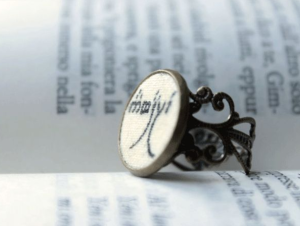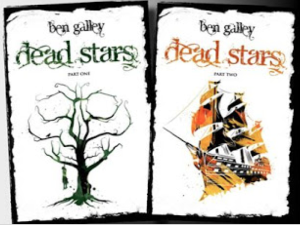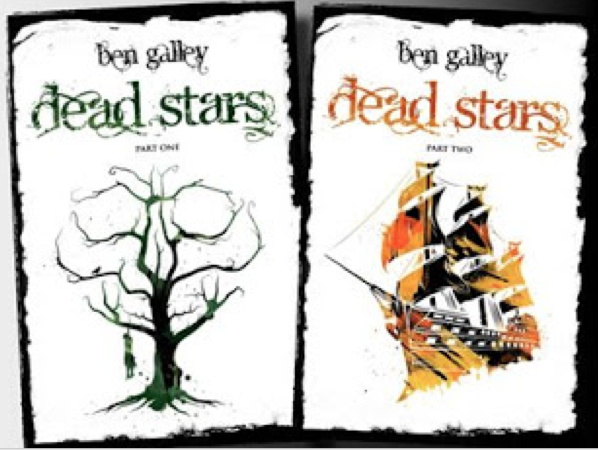OLD POST ALERT! This is an older post and although you might find some useful tips, any technical or publishing information is likely to be out of date. Please click on Start Here on the menu bar above to find links to my most useful articles, videos and podcast. Thanks and happy writing! – Joanna Penn
Fantasy is a huge niche and one with plenty of fanatical fans. It's a brilliant genre to write in and today, Ben Galley, fantasy author and self-publishing expert, discusses the main aspects.
 It’s hard to write a guide to a whole genre, especially one as vast and as intricate as fantasy, but as a zealot of all things fantastical, it’s something I want to tackle.
It’s hard to write a guide to a whole genre, especially one as vast and as intricate as fantasy, but as a zealot of all things fantastical, it’s something I want to tackle.
Let’s jump straight in by looking at the main aspects of the average fantasy book:
By definition, fantasy is a genre that typically features the use of magic or other supernatural phenomena in the plot, setting, or theme. Magical or mythological creatures often feature, as well as races other than humans, such as elves, dwarves, or goblins. The worlds within fantasy books are usually medieval in style, both in terms of technology and culture. This is what primarily sets fantasy apart from sci-fi.
So that’s it. There’s your fantasy genre in a nutshell. But like any genre, it can’t just be labelled or confined by one paragraph. Fantasy is a very wide and ever-evolving genre, straddling many different sub-genres at once, or even mixing with completely separate genres.
Sub and splinter genres
There is a veritable plethora of them.
To name a few: there’s epic fantasy (involving disgustingly thick books and very long series), high fantasy (usually very traditional and Tolkienesque), dark fantasy (which mixes in horror or grim themes), grimdark (employing a dystopian element in the world or plot), steampunk (a mix of fantasy and Victorian, clockwork, and steam elements), arcanepunk (a blend of scifi and fantasy), historical fantasy (incorporating magic into historical fiction, often mixed with the ‘sword and sorcery’ subgenre), and lastly, urban fantasy (which blends the ideas of magic and myth with modern day worlds.)
Quite bamboozling, isn’t it?
Just why are there so many sub and splinter genres? It’s because fantasy, since the books Tolkien and Robert E. Howard and Fritz Leiber, has somewhat burst its banks. Fantasy is in a unique position where it can seem tired and radically new at the same time. Boundaries are therefore pushed, and stereotypes tweaked, to keep its core values alive.
For instance, the idea of magic is an old one but fantasy authors seem relentless in their quest to turn it on its head. Unlike genres such as crime or romance, fantasy is theoretically limitless, thanks to its very nature. It’s this reinvention and experimentation that appeals to many authors, me included.
Build yourself a World:
World-building is hugely important to fantasy. I would say that 50-60% of the work a fantasy author has to put in to a book consists of world-building.
Why? Well, fantasy rests on the use of strange and unfamiliar worlds. Authors must dream up cultures, races, religions, histories, weather, clothes, food, music… all the different aspects that we take for granted in our own world. Making this world rich enough and deep enough is the tricky part. It’s an important job, especially when you consider the implications a world has on the plot and your characters. What if there were two suns in your world, rather than one? What if there was a war going on? Or what if it rained molten lead? Your world affects everything in it. That’s why it’s important. For a great example of world-building, look at Brandon Sanderson’s Way of Kings books.
Magic:
Magic. It’s almost a prerequisite of the genre. (Even though there are fantasy books that don’t feature magic in an obvious way, they still deal with other worldly occurrences, or the supernatural.)
Let me introduce you to something called the magic system. A common phrase used by authors and fans alike. A magic system is how magic in your world works. For instance, reading spells aloud is a form of magic system. Again, the opportunities are almost limitless. What about drawing magical abilities from pain (as in Fade to Black, by Francis Knight)? Or eating different metals for different effects (called Allomancy, another Brandon Sanderson gem)? Just like the boundaries of fantasy itself have expanded, so has the idea of magic – what it can be, and where it comes from. When writing your fantasy, try and mess around with your idea of magic. It’s another chance to be creative and individual.
Incorporate some mythology:
Fantasy draws a lot from classical mythology. Why?
Because mythology also consists of monsters and creatures and magic. The two lie very close together when it comes to contents and themes. Tolkien borrowed a lot from mythology when he built Middle-Earth, using Nordic, Germanic, and archaic English myths and legends. I use Nordic and near-Eastern mythologies in my Emaneska Series. Even if you don’t want to borrow a whole pantheon or myth, borrow the creatures, plots, or heroes instead. It creates a bit of familiarity in your book, and also give you the chance to play with some stereotypes too, both of which can make for interesting reading.
As you can see from this quick examination, fantasy has few boundaries. Those that it does have lie within the author’s imagination, or the intricacy of a magic system and its rules. What I like about fantasy, and why I love writing it, is this license to experiment, to dream big. You could write about fire-breathing squirrels if you were so inclined. That’s the beauty, and, pardon the pun, the magic of this genre. No limits, an incredibly open-minded audience, and the opportunity to truly create something different.
Do you read or write fantasy? Do you have any tips or questions about writing fantasy? Please leave your comments and questions below.
 At 25, Ben is a young self-published author from sunny England. He is the author of the fast-paced fantasies of The Emaneska Series – a trilogy likened to the gritty love-child of “Lord of The Rings and Sin City”. Ben is incredibly zealous about inspiring other authors and writers.
At 25, Ben is a young self-published author from sunny England. He is the author of the fast-paced fantasies of The Emaneska Series – a trilogy likened to the gritty love-child of “Lord of The Rings and Sin City”. Ben is incredibly zealous about inspiring other authors and writers.
He runs the popular advice site SHELF HELP, where he offers honest and simple advice about writing, publishing, and marketing. He wants to help others turn their passion into their profession, and to follow their wildest dreams. Ben can be found being loquacious and attempting to be witty on Twitter (@BenGalley) or at www.bengalley.com
Top image: Literary jewelry Tolkien cufflinks from Luxpresso



HI
My first short novel was published in July and it is fantasy. I am writing a five part series. In my fantasy I created a new world, a fantastical world where miracles can happen. I agree that a lot of fantasy includes magic but I also think that fantasy can consist of a shift in worlds and no spell casting to make it click into the genre. I didn’t use outright magic but Osipia does indeed evoke magic. Creative license is what makes our fantasy worlds pop. In writing fantasy we are given the opportunities to create new races, other sentient beings, other worlds and realms. The color of the sky can be the color we wish to make it, creatures can evolve, wars and battles between light and dark can occur and those that fight those worlds can be as magical and fantastically different as we write them to be. Outside of grammer and punctuation when I write fantasy there are no rules.
Great post thank you for sharing.
Jennifer Deese-author.
I like writing fantasy, but I want a long one, with a huge series (epic fantasy) . Can someone give a tip as to how I can enlarge my current books so they are as long as harry potter books?
I would expect that you will need to do a lot of world building and plotting – check out some of Rowling’s plotting here http://www.openculture.com/2014/07/j-k-rowling-plotted-harry-potter-with-a-hand-drawn-spreadsheet.html
You forget one type of fantasy, and that is Portal Fantasy, in which a “normal” person from our world magically discovers a fantasy world and has an adventure. Though a lot of portal fantasy sucks, some authors do it pretty nicely; the 100 Cupboards books were excellent stories.
wow Ben, you seriously helped me here. I’m trying to write a medieval novel and your pointers are realy helpful. but cant we avoid magic and write the realistic medieval story for a while? i’m thinking of avoiding magic until a sequel or a third book
Hello from a casual comment reader here!
Kay – nothing wrong with a realistic medieval story, but if it doesn’t have something “fantastic” in it – e.g., something not of our real world, then it’s not really fantasy…. it could be straight historical fiction, or alternative history fiction. I don’t know what you would call it if you wrote a story set in a medieval Europe like place, but didn’t call it Europe ( or France, or where-ever) and populated it with humans and didn’t have any magic or mythology or beings that don’t exist. E.g., just because St Mary Mead and Miss Marple don’t (or didn’t) exist doesn’t make Agatha Christie’s Marple stories fantasy – they are clearly set in an England of the 1920s/30s etc.
I think it would be a bit confusing for the reader to read one book in a trilogy/series, which seems “normal” and then have magic exist in the second book, or conversely, to get your book expecting a fantasy , and then discover that it doesn’t turn into a “fantasy” until a book or two later – unless you have a good reason and recognition of the notion that the magic should be there, that something is wrong in your story world and this is part of the plot?
Ultimately, categories and genres are just labels, and are partly about marketing – but in the marketplace customers may be peeved when they buy a jar off the jam shelf and find they have bought pasta sauce.
Anyway, good luck in your writing…
Seb
I’m writing a fantasy series and so far, it’s going great. But I DO need help on what magical creatures to incorporate. So far, I’ve used dwarves, goblins, trolls, dragons, and Giants. I want to incorporate more, and I want them to seem non-typical, but I don’t want them to be too outlandish. Any ideas?
Try taking one of those creatures and changing a single aspect of one to see if something clicks. Another way to creature unique creature is to take aspects of creatures and combine them. A example of this is the hippogryph, which has the front half of an eagle and the rear half of a horse. I hope this gives you some ideas for your writing and world expansion. Good luck.
unicorns, fairies, mermaids,
Hi
I am an aspiring beginner and I want to write a fantasy trilogy. Please give me some tips on the different worlds, maps, etc
Hi,
I write fantasy- a mashup of subgenre (gotta love the indie revolution:).
I think for world building and fantasy aspects, it helps to draw on cultural aspects first. I always try to look at, and ask how my world-culture does something important, or how they view something, as a culture. Birth, death, ceremonies are a great way to delve off into new territory.
As for general ideas, most of mine start with some seemingly silly “what if…” kind of question. And then filling in the blanks, as the what if game ripples out, as I play with how that changed fact might affect all aspects of a person’s life, and the culture as a whole.
For example, the underlying premise for Chanmyr Chronicles (book one out soon) began with “What if people could see auras?” And at first I presumed this might create a utopian culture. Then I started to think about how this ability might get used and misused, personally and culturally. I then created a race that is magical, and has this ability -as well as others- in a much more powerful and natural aspect.
Anyway- one simple premise can create a universe. I remember reading Mission of Gravity (author?) years ago, which seemed like a completely preposterous premise, until at the end, there was a follow-up with the author, who was writing from a kind of hard core sci-fi aspect. his starting premise was, what life might evolve in a very high gravity world. and he went from there, with such aspects that falling from more than 5 feet(?) was lethal, etc…
SO, I suppose, imagination, following threads out fully, and research (background in anthropology helps;)
TJ Muir
Your are incorrect on what a premise is. A premise is a statement of character, conflict, and conclusion. Using the “what if?” does NOT give you a full premise, it generates a story idea. A premise MUST have a conclusion attached to its statement otherwise it is NOT a premise. “What if people can see auras?” is NOT a premise because it contains no conclusion. An example of premise is Romeo and Juliet’s “Great love defies even death”, death being the inevitable conclusion of said premise that is their great love, which it is in Romeo and Juliet. “What if people can see auras?” doesn’t contain a conclusion, it’s just an idea for a story. I think you are confused as to what a premise really is. Another example of premise is, “Alcoholism destroys marriage.” Character = character who is or will become an alcoholic. Conflict & Conclusion = destroys a marriage… which takes place over the course of the story through rising action. THAT is a premise.
I am trying to write my very first fantasy novel. However, I have hit somewhat of a “snag”. I do not wish to use units of measurement, such as time, distance, and volume in my story if they are solely indigenous to our earth (e.g. years, miles, seconds, etc.), In my mind I cannot justify their use in an alien world. But when I try to substitute other words for similar unit names, I find I either have to break up the narrative to explain the concept, or I try to explain it in the context of the character dialog. Unfortunately, the latter, which is more graceful, tends to be a bit more enigmatic than I would hope in the communication to the reader. How does a veteran such as yourself in this genre overcome this dilemma? Thank you for your time!
Think of the reader and don’t disrupt their experience. That’s the main rule. Maybe read a lot of other fantasy books and see how they handle it. All the best!
Thank you. All the best to you, as well, and Happy New Year!
I’m trying to make a fantasy fiction book so far I got two chapters done but I need help on developing the story a little.
I am writing a short book (about 175 pages).
It is about a newly re-established Royal Kingdom in Europe whose throne was last occupied 400 years earlier. In looking for the modern-day heir, they find him in America.
He assumes the throne and the story begins. No magic. No outer-space. Just a story.
But I do not know which genre to classify it under. And without knowing the proper genre, the publishers will not accept it.
Can someone help by emailing me and letting me know? I would really appreciate it.
Getting some inspiration from the other authors in the genre can help you improve your fantasy story a lot. Reading the works of established fantasy authors can expand your literary knowledge, and give you some ideas on how to go about your own fantasy story.